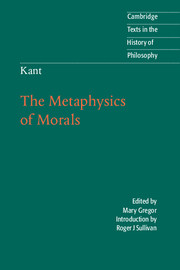II - Public right
from Part I - Metaphysical first principles of the doctrine of right
Summary
The Right of a State
The sum of the laws which need to be promulgated generally in order to bring about a rightful condition is public right. – Public right is therefore a system of laws for a people, that is, a multitude of human beings, or for a multitude of peoples, which, because they affect one another, need a rightful condition under a will uniting them, a constitution (constitutio), so that they may enjoy what is laid down as right. – This condition of the individuals within a people in relation to one another is called a civil condition (status civilis), and the whole of individuals in a rightful condition, in relation to its own members is called a state (civitas). Because of its form, by which all are united through their common interest in being in a rightful condition, a state is called a commonwealth (res publica latius sic dicta). In relation to other peoples, however, a state is called simply a power (potentia) (hence the word potentate). Because the union of the members is (presumed to be) one they inherited, a state is also called a nation (gens). Hence, under the general concept of public right we are led to think not only of the right of a state but also of a right of nations (ius gentium) or Since the earth's surface is not unlimited but closed, the concepts of the right of a state and of a right of nations lead inevitably to the idea of a right for all nations (ius gentium) or cosmopolitan right (ius cosmopoliticum).
- Type
- Chapter
- Information
- Kant: The Metaphysics of Morals , pp. 87 - 138Publisher: Cambridge University PressPrint publication year: 1996
- 1
- Cited by



